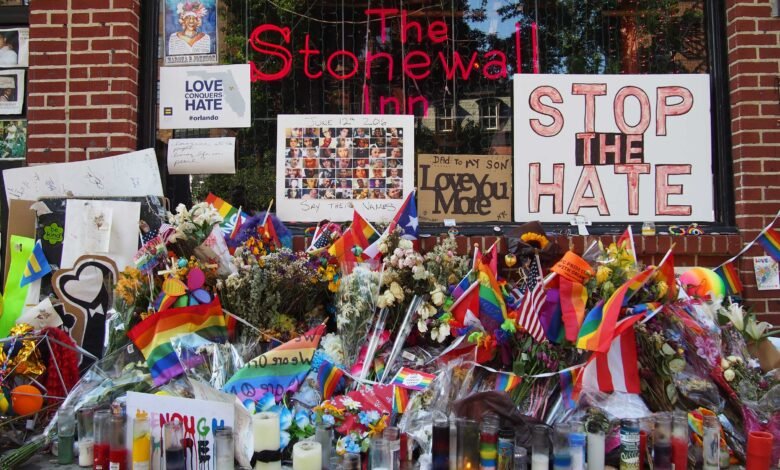LGBTQ+ Pride: What’s changed from Gen X to Millennials?

This Pride Month we decided to take a look at two different but intersected perspectives on what this month means in our current environment. The first is from Mental Health America’s President and CEO Schroeder Stribling, and the second is from Mental Health America Director of Public Awareness and Education Em Skehill.
Gen X: Schroeder Stribling
The joy in Pride Month is indisputable. Millions of LGBTQ+ individuals and communities and supporters come together in waves of colorful celebration, and after all these years it’s still thrilling to call out “Happy Pride!” to a friend across the way.
My own lifetime has spanned the years from Stonewall to legalized same-sex marriage. Along the way, the mental health field tossed out pathologizing definitions of LGBTQ+ folks.
Remembering our proud history of struggle and progress will power our resolve and sharpen our wisdom. From Harvey Milk and Marsha P. Johnson, to the extravagant balls in “Paris is Burning” and the black-and-pink T-shirts of Act Up proclaiming Silence=Death, to Don’t Ask Don’t Tell to Obergefell – we should remember it all this Pride Month.
But now in my 50s, I worry that our progress is eroding. We have seen the introduction of numerous anti-LGBTQ+ legislation at the state level, specifically anti-trans legislation, and threats to drag events this year have been rampant.
In my mind, the black-and-white image of drag queens being shoved into a paddy wagon is juxtaposed with the colorful Barbie lawn display I saw in Washington, D.C.: sparkly, decked-out dolls with a sign that read “Drag Is Not a Crime.” It seems the clock is ticking backwards.
I worry for the queer youth of today. I worry about the mental and emotional toll on LBGTQ+ students in schools where pronoun recognition or queer-positive library books are being debated. I worry for trans adults in states where their access to ongoing medical treatment is threatened. I worry especially for Black, Indigenous, and people of color (BIPOC) youth and young people of all intersectional identities who are at risk of exclusion and discrimination on several fronts.
This Pride Month, we commit ourselves to understanding the lived experience of LGBTQ+ youth, being responsive to their needs, and following their leadership.
Millennial: Em Skehill
The joy in Pride Month is indisputable. While we love our queerness all year, June is a time when we get to see, experience, and celebrate ourselves even more loudly. The sense of community and love among LGBTQ+ folks often feels stronger and deeper, and it’s a time I feel more connected than ever to our queer ancestors across the globe. Those positive feelings aren’t gone this year, but they are certainly complicated by current events. In 2023, it feels like we have gone backwards after coming so far – trans rights are being stripped away, and in many areas it isn’t safe to celebrate, or even visibly identify as queer.
Within the queer community there’s an unspoken understanding that this year, Pride is scary. With the increase in mass violence – especially toward identity groups, and even more so toward the trans community – Pride celebrations feel like an obvious target. Multiple far-right extremist groups are planning to escalate attacks on our community this month. While we hope these plans are thwarted, many feel like there’s no way to guarantee both our safety and our pride.
On a less threatening, but still hurtful, level, we see our month watered down by rainbow capitalism – corporations using Pride Month as a performative business strategy without actually supporting the LGBTQ+ community. It turns the focus of Pride away from LGBTQ+ protests, rights, and freedom and toward mainstream companies – many of which, sadly, drop their support come July 1. This year, we’ve felt that allyship taken away from us before June even began with a number of businesses deciding to cancel planned events or merchandise releases related to Pride.
You may have seen this tweet circulating recently: “For pride month this year, can straight people focus less on ‘love is love’ and more on ‘queer and trans people are in danger.’” Many people consider themselves an ally in that they support LGBTQ+ rights and join in Pride celebrations, but it hurts when they don’t show up in the ways that we need them.
We’re challenged this month with holding our love for Pride and everything it means, while enduring an onslaught of identity-based discrimination, hate, and trauma. We’re experiencing multiple feelings at once that really run the gamut – from joy to sadness to fear.
Pride Month grew out of the 1969 Stonewall Riots. This month isn’t rooted in celebration, but in resistance, human rights, and reclaiming our narratives from people who hate or deny our existence. Part of that does include celebrating us. Joy is a form of resistance.
Whether you identify as LGBTQ+, are questioning your identity, an ally, or simply curious to learn more, we hope everyone takes some time this month to consider how the current environment is affecting your mind or those around you. Learn more with our resources. Mental Health America will continue standing with the LGBTQ+ community and working to make our country safe for all, no matter how they identify.
Source link
#LGBTQ #Pride #Whats #changed #Gen #Millennials

